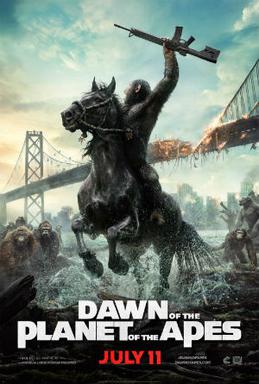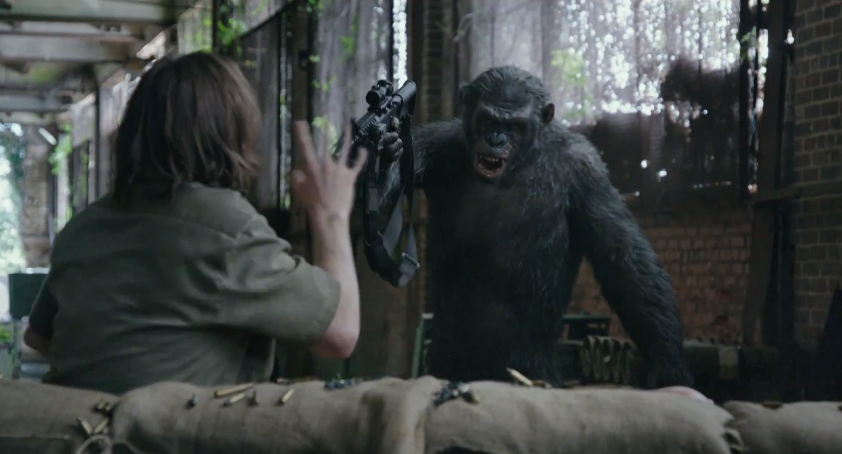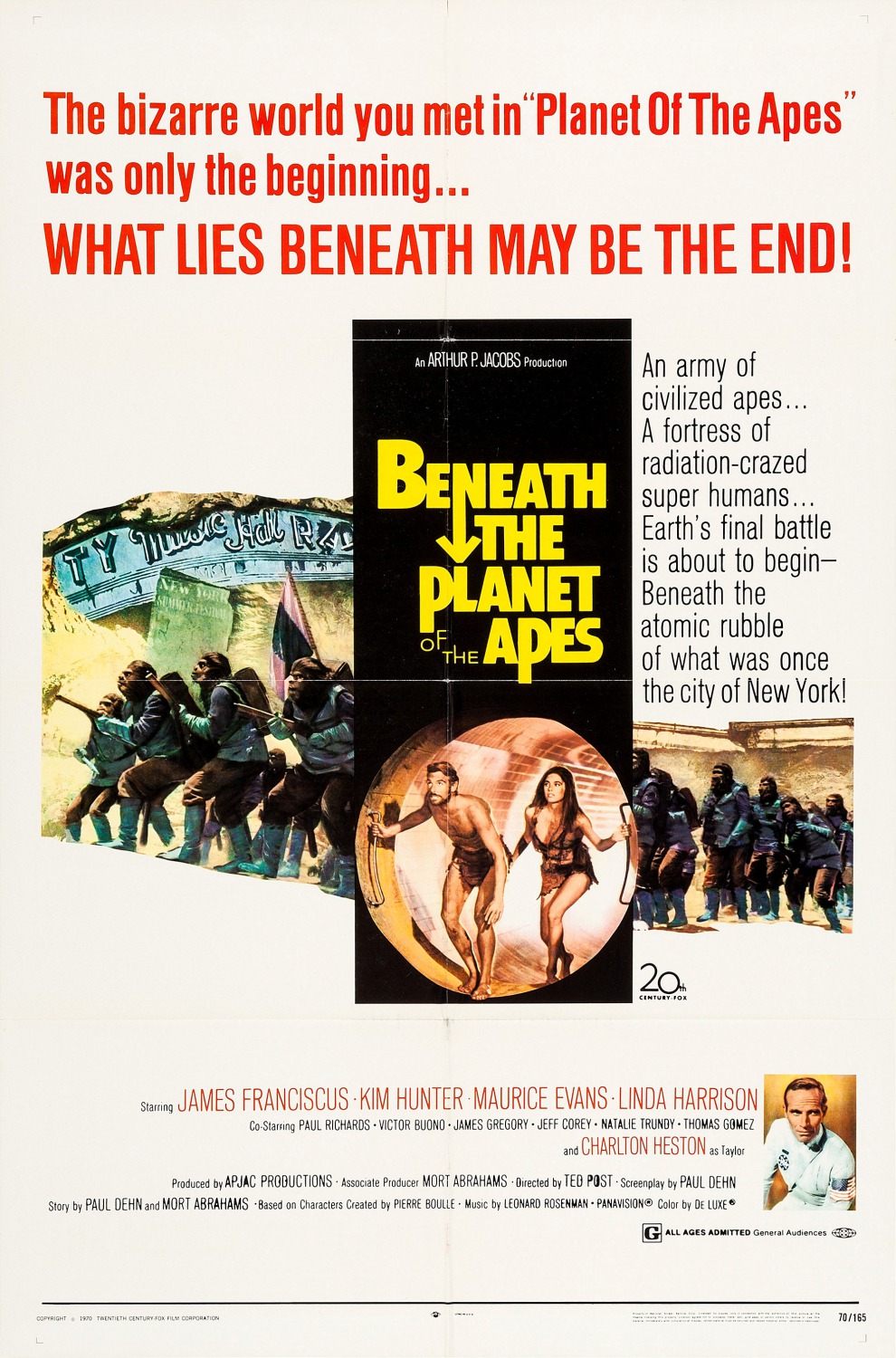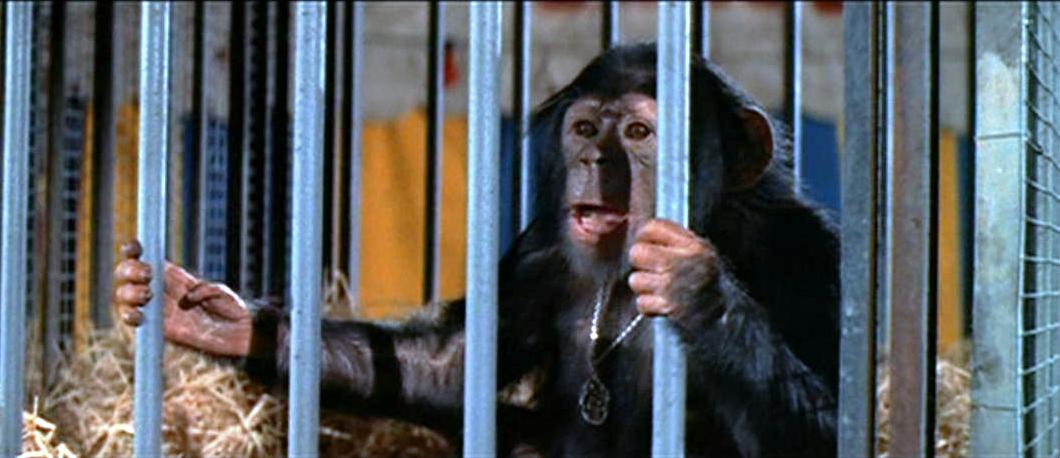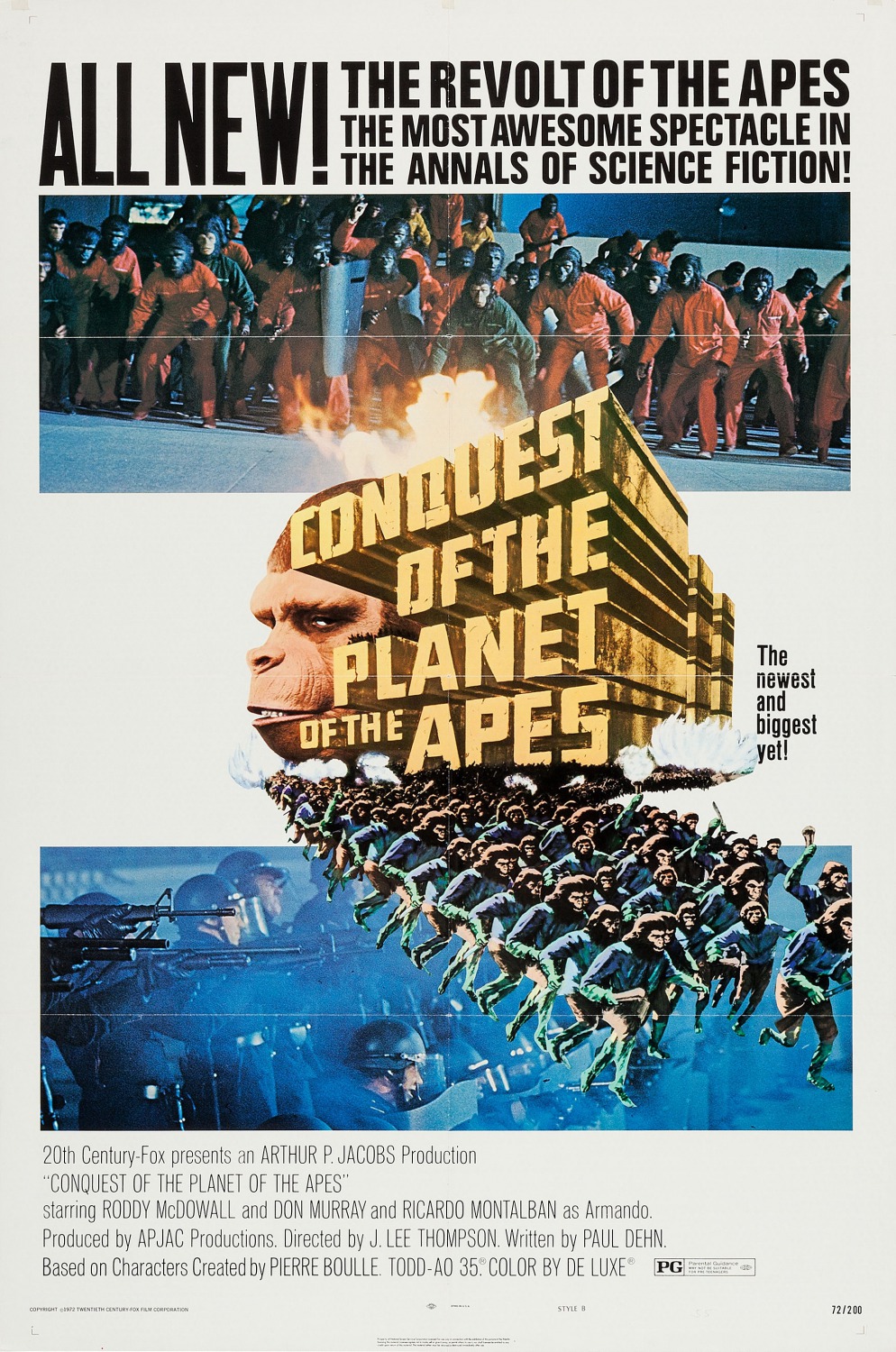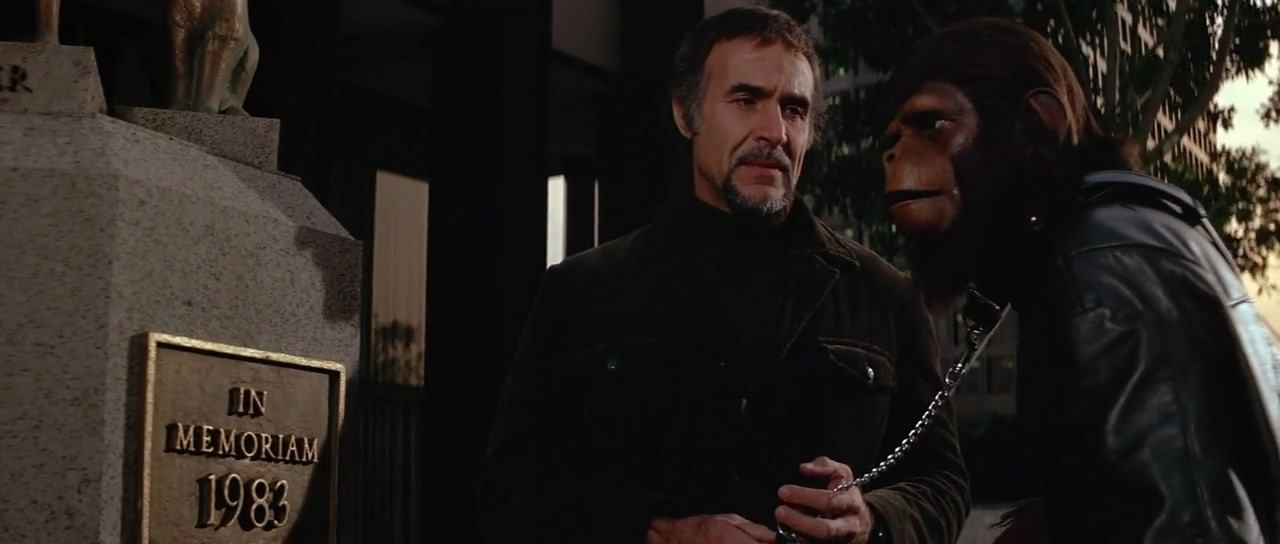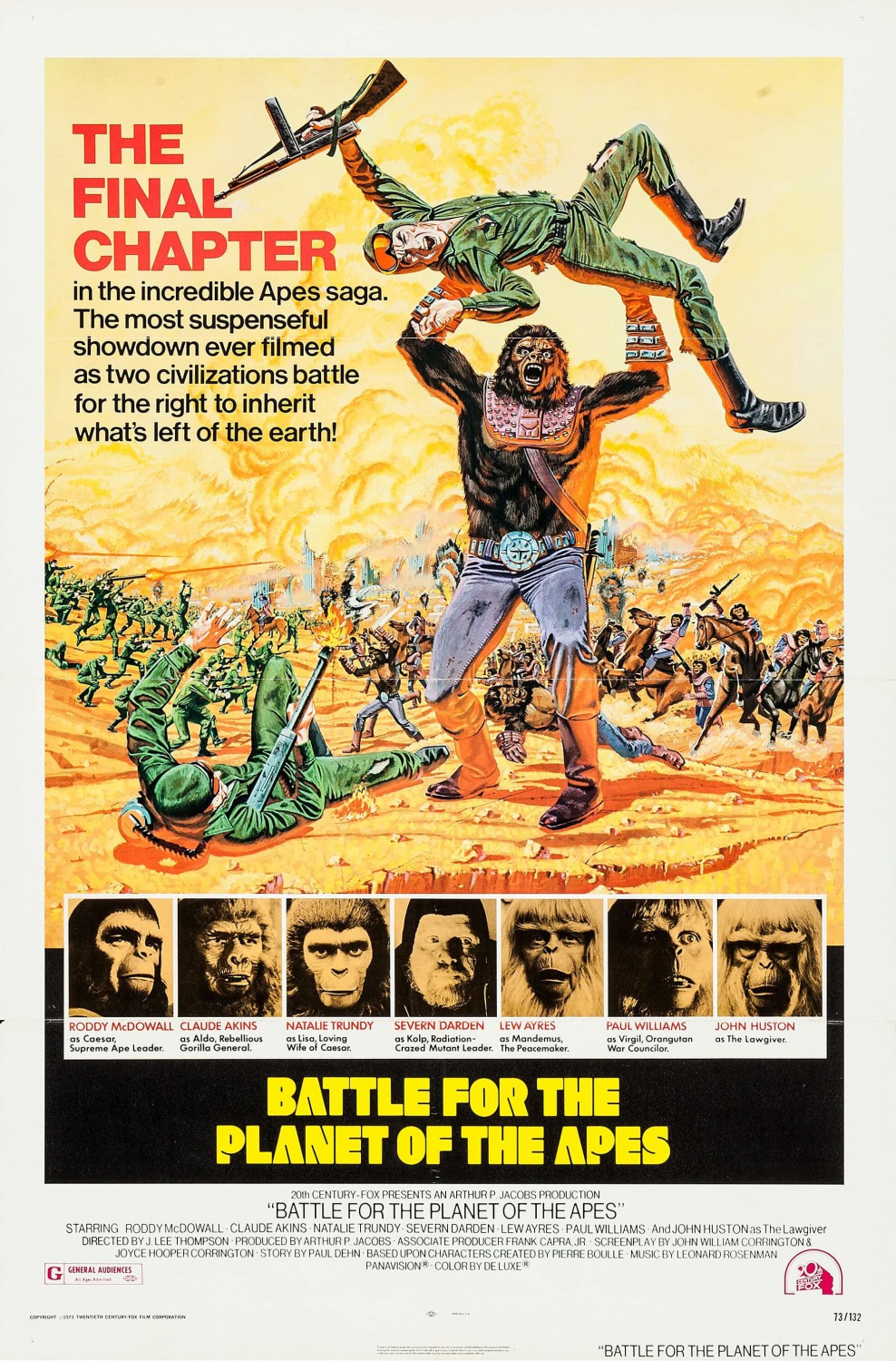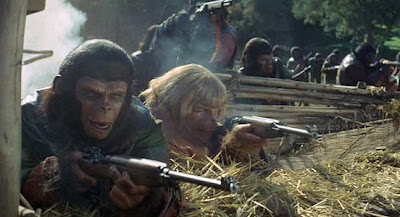Warning: This article discusses Dawn of the Planet of the Apes in depth, so don't read until you've seen the film.
Pierre Boulle wrote the novel Planet of the Apes in 1963. He created an absurd and ingenious vision of a planet where civilization had been turned upside
down. On this alien planet apes- who drove cars and wore suits- ruled over
primitive humans. The novel had depth but when it was adapted in to the classic
1968 film with Charlton Heston the story became a much darker allegory. In the novel the ape planet was an alien world light years from Earth. The film’s
ending reveals that Heston’s astronaut George Taylor was on Earth along. He
discovers the ruins of the statue of liberty on the shore. This image of the statue symbolizes mankind’s
ultimate self-destruction. As the series progressed through four sequels the
films became even bleaker and we found ourselves becoming emotionally invested
in the ape characters. The mythology also deepened and expanded, eventually becoming a circular tale via time travel.
In 2011’s Rise of the Planet of the Apes and this year's Dawn of the Planet of the Apes we're no longer merely in the realm of the absurd. Instead we’re treated with a world that
feels remarkably real and emotionally immediate. These films lean toward a more
realistic take on the mythology, which isn’t too surprising given Hollywood’s
tendency to “ground” certain genre properties nowadays. But thankfully these two films
aren’t self-consciously grim and gritty. Even so, the Planet of the Apes series was never without its dark elements.
Moreover- these two films are so distanced in the timeline from the world of
the original film- that this tonal grounding doesn’t feel like posturing on
behalf of the filmmakers.
Dawn of the Planet of
the Apes does the mythology justice and succeeds as both a standalone film
and a sequel to Rise of the Planet of the
Apes. Dawn builds upon the
foundation laid in its predecessor, both enriching the first film as well as
using that foundation to tell a complex story about the quest for peace and the
possibility of co-habitation between apes and humans. Rise was a re-working of
the series fourth installment, Conquest of
the Planet of the Apes. Dawn, in
turn, reinterprets the final film in the series, Battle for the Planet of the Apes. On paper, using the fourth and
fifth films in a franchise as the basis for a new starting point for a series seems
odd. But in the case of Planet of the Apes,
these films make sense in terms of re-starting the franchise. Taking influence
from Conquest and Battle allows the new series to work
both as a spiritual prequel to the original film as well as doing something
different with this franchise rather than just re-visiting the initial concept.
Dawn takes place
10 years after the events of Rise. After
the obligatory news broadcast opening, which details the spread of the simian
flu- the result of scientific testing on apes in the pursuit of finding a cure
for Alzheimer’s- we’re reintroduced to Caesar (played via motion capture by
Andy Serkis)-the hyper intelligent ape around which the first film largely
centred. Caesar now rules over a clan of apes in post-apocalyptic Earth. I do love the opening scenes of the apes hunting food- which harkens back to apes hunting humans in the original film- then returning to their home, where we see them living a peaceful existence, no longer in fear of captivity. The apes are unsure that humanity even still exists but are soon made aware of human survivors.
They come in to the apes' forest, hoping to
gain access to a dam that could provide power to the city in which
many remaining humans live. The apes tell them to go away, which shocks the humans, since they didn't know the apes were capable of speech. Caesar and the apes
follow the humans back to the city. Caesar states that apes don’t want war.
He wishes for the humans to stay in their territory while the apes will stay in
theirs. Malcolm (Jason Clarke) goes back to the forest in an attempt to persuade
Caesar to allow them access to the dam. Caesar concedes but his second in command Koba
(Toby Kebbell) presents a threat; he still harbours hatred toward humans from
his days being a guinea pig.
Caesar isn’t entirely a pacifist but he’s no war-monger
either. He doesn’t want to go to war with humans, though Koba does. Caesar
feels that by allowing the humans access to the dam he’s working in the best
interests of his kind, avoiding any conflict that could get the apes killed. But
it’s evident that Caesar has learned kindness and compassion from the noble
humans he’s met. He also sees Malcolm is a good man and senses the humans are
desperate.
Caesar and Koba represent “two sides of the same coin.” Both
were the result of testing by humans that made being super intelligent- and both
were imprisoned by humans and treated with cruelty. But while Caesar knew love
from his surrogate father, scientist Will Rodman (James Franco) and Will's Alzheimer’s
stricken father Charles (John Lithgow), Koba never knew love from humans. When
Caesar mentions that humans need to work on the dam Koba points to his
numerous scars and repeats “Human. Work.” It’s this moment that encapsulates Koba’s
back-story and his view on humanity. Caesar doesn’t completely trust humans but
he’s left a lot of his bitterness behind, becoming a family man- married to
Cornelia (a underused Judy Greer) and the father to both Blue Eyes (Nick Thurston)
and a new born ape. Koba is a complete lone wolf (or ape).
There’s almost something Shakespearean about the power play
between Caesar and Koba. Like many characters in Shakespeare, including the
kings, Caesar is brought down by someone he trusted. Akin to his namesake,
Caesar has a Brutus, which is Koba. There’s even a silent “Et tu Brute?”
between them. Koba shoots Caesar using a human gun and blames the supposed
assassination on the humans, leading the apes in battle against the humans. Caesar
“loved wisely but not well," to quote Othello. He tells Blue Eyes- after Koba has taken over the city- that he trusted Koba because he
was an ape.
Caesar’s character arc through this film leads to the
realization that apes can be as treacherous as humans. When Malcolm finds Caesar
alive, Caesar has them stop at his former house. He views the video recording
of Will teaching him sign language. Caesar and the audience are reminded in
this scene of how far Caesar has come, from a baby to a revolutionary to a leader. I also
think this video shows Caesar how the love he received from Will is what made him trust Malcolm. When Malcolm asks who was on the video
Caesar simply tells him “A good man. Like you.” Malcolm and Caesar don’t have
the same emotional connection as Will and Caesar but a mutual respect grows
between them.
One element I found fascinating while thinking back on the
film relates to its anti-gun message. While it’s Koba’s actions that lead to
the mass violence in the story the film uses the image of a gun to represent the threat between ape and human peace.Caesar doesn’t want the humans to bring in guns. In
one scene it’s discovered that Carver (Kirk Acevedo) has brought in a gun. This
leads to tension after a charming moment between Ellie (Keri Russell) and
Caesar and Cornelia’s baby. Koba uses a gun to frame the humans for Caesar’s
death and manipulate the apes in to violence.
The anti-gun message stands out to me because Charlton
Heston- the star of the original film- became infamous for being the president
of the NRA in his late years. He famously declared “From my cold dead hands” in
defense of the second amendment. While I won’t be as presumptuous as to say the
film is an attack on Heston’s political views, it’s hard to imagine that the image Heston created for himself wasn’t in the back of the screenwriters’ minds. The
issue of gun rights has arguably never been a more pressing issue in the States
then it is now. The Apes films always
commented on the state of the world during the 60s/70s. It only seems
appropriate that the film would confront this particular issue.
While most blockbusters present violence and destruction as
the only means to defeat evil, violence doesn’t solve anything in this film.
Even when Koba is defeated his actions have led humans and apes to brink of
war. Despite having some spectacular images of apes on horsebacks using machine
guns (which to be fair is awesome) and a stunning action climax, Dawn is sincerely anti-violence. As in Battle the
apes themselves even preach against violence against their own kind. main ape commandment is “ape shall never kill ape.” To be better than humans the apes must not murder each other like humans. Koba breaks this commandment
when he kills Rocket’s son Ash, who won’t kill a human. Despite hating humans,
Koba is not above killing apes if they stand in the way of destroying
humanity. By killing an ape Koba shows that he's no better then the humans he despises. He's capable of the same treachery and murder of his own kind.
And as a
leader, Koba is the opposite of Caesar, a tyrant.
Koba hangs on a edge
at the film’s climax, after a fight between him and Caesar. He says to
Caesar “Ape shall never kill ape,” to which Caesar grabs his hand and
then intones “You are not ape,” letting him fall, echoing Koba’s execution of
Steven Jacobs (David Oyelowo) at the end of Rise. By betraying the commandment Koba is no
longer an ape. He’s a twisted version of an ape that needs to be let go. But
while Koba dies he still gets what he wants, a war between apes and humans. The ending of the film is similar to that of
Christopher Nolan’s The Dark Knight in that the heroes don’t really win. Caesar
didn’t want a war but now he has to fight against humans if his kind is to
survive. Just as how Batman had to take the fall for Harvey Dent’s crimes to
save Gotham's soul.
Malcolm tells Caesar he thought humans and apes had a chance
to live peacefully together. Caesar replies that he did too, calling Malcolm
his friend. This is an incredibly sad ending. Malcolm and Caesar parting ways represents the final breaking of apes and humans, the destroyed hope of peaceful co-habitation
Similar to Rise, Dawn’s main flaw is the characterization regarding its human characters is a touch too thin. I really wish I got to know these people a little better. I do, however, like that the film allows these people to share very human moments. The characters as a result aren’t completely soulless. I like the parallel between Malcolm and Caesar being fathers who are attempting to get close to their sons. Malcolm’s son Alexander (Kodi Smit-McPhee) is still adjusting to his new step mom, the aforementioned Ellie. The film is very male dominated. The female characters- Ellie and Cornelia- have even less characterization than the males. Clarke makes a solid lead, showing both vulnerability and an inner strength. Russell does well with what little she’s given. Gary Oldman also does fine work as Dreyfus, the human leader. While Dreyfus could’ve been made in to a shallow human villain there’s an devastating moment where we learn what Dreyfus has lost.
Matt Reeves takes over the director’s chair from Rise’s Rupert Wyatt. This is Reeves’ fourth film, following The Pallbearer, (1996) Cloverfield (2008) and Let Me In (2010), the remake of the Swedish Vampire film Let The Right One In (2008). Reeves is also known as the creator of the TV series Felicity (starring Russell.) Let Me In is the only previous directorial effort from Reeves that I had seen before this film. While that film strewed too close to the original, Reeves’ direction was elegant and his command of tone impressive. Reeves bring that same directorial elegance to this film. While there is plenty of action as the film progresses, Reeves doesn’t stage the action in an empty, bombastic fashion. The ape attack on the city has real dramatic weight and a conscious sense of horror to it. A 360 degree shot on the top of a tank blends beauty and utter destruction majestically. This shot reminds me of the shot from Let Me In, in which we're in a car as it rolls over. Like Wyatt, Reeves favours build up to outright bombast. This is even more leisurely paced in some ways than Rise was. But I like how the film is more interested in story-telling and atmosphere then it is in set pieces.
The motion capture work in the previous film was impressive but it feels like it’s on another level here. Serkis has revolutionized film acting over the last decade. His work as Gollum changed how we thought about CGI characters on film. His work on Caesar is even more nuanced and emotional. To me Caesar feels as real any modern film character and it’s been amazing witnessing his journey as a character over these two films. Kebbell also deserves props for making Koba a haunted antagonist, a character whose evil masks their own hatred and bitterness. Koba is an incredibly tragic character who’s as important to this film as Caesar.
I don’t want to oversell Dawn of the Planet of the Apes but I think Hollywood would be in better shape if more blockbuster type films were like this. In its strongest moments it comes as close to an artistic vision we’ve seen in a franchise tent pole this summer. Rise and Dawn show that franchise films don’t have to be completely corporate mandated and soulless- that there’s potential to create compelling stories using a familiar brand. Both RIse and Dawn have redefined- for me at least- how I view this franchise and what it’s capable of artistically. And I'm excited to see where the series goes next.
